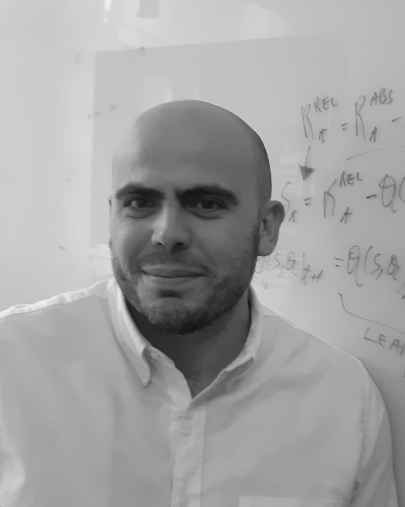Stefano PalminteriLaboratoire de neurosciences cognitives et computationnelles (LNC2) - Inserm / ENS Paris
Mes recherches
J’ai réalisé mon doctorat sous la supervision du Dr Mathias Pessiglione, à l'Institut du cerveau et de la mœlle épinière (Hôpital de la Pitié-Salpêtrière, Paris). Mon premier post-doctorat a été réalisé au sein du Laboratoires de Neurosciences Cognitives (ENS, Paris) et du « Centro Mente e Cervello » (Université de Trento, Trento) sous la direction de Giorgio Coricelli. Mon deuxième post-doctorat a été réalisé à l’« Institute of Cognitive Neurosciences » (University College London, Londres) dans l'équipe de Sarah-Jayne Blakemore. Mon troisième post-doctorat a été réalisé au sein de l'équipe d'Etienne Koechlin au Laboratoire de Neurosciences Cognitives (ENS, Paris). Les principaux sujets de recherche de l’équipe que je dirige sont l'apprentissage par renforcement et la prise de décision. Plus précisément, je souhaite comprendre les bases computationnelles et neurobiologiques sous-jacentes à ces processus et comprendre comment des déficiences dans ces processus pourraient émerger dans des symptômes neuropsychiatriques. Les techniques que j’ai principalement utilisées jusqu’à présent sont des tests comportementaux rigoureux, la modélisation mathématique et l’imagerie par résonance magnétique fonctionnelle. Plus récemment, j'ai également mené des recherches sur les développements cognitifs et en économie comportementale, en combinant des expériences au laboratoire à des expériences réalisées en ligne grâce à des objets connectés (téléphones portables, tablettes et ordinateurs).
Mon projet ATIP-Avenir
Human learning biases: neurocomputational bases and their relations to physiological and pathological human variability
Whereas the investigation of decision-making biases, in the form of deviations from optimal decision-making, has a long and venerable history in economics and psychology, learning biases have been much less systematically documented, investigated and formalized. This is problematic since most of the decisions we deal with in everyday life are experience-based and choice contexts are often recurrent, thus allowing learning to occur and influence decision-making. The relative lack of experimental investigation of learning biases is also surprisingly considering the great importance of these processes might play in psychiatric pathogenesis and economic maladaptive behaviour. In the present proposal we aim at studying learning biases at different levels of investigation (behavioural, computational and neural) and to try to link them to interindividual variability. The results expected from this project will be of several natures. First, computational and behavioural studies will lead to the proposition of models that explain learning biases and idiosyncrasies observed in human subjects. Second, we will identify the neurobiological determinants of these biases in both terms of anatomical and functional correlates. The neural mapping of learning biases will help us to understand why the biases themselves arise (neural constraints) and also to formulate hypotheses concerning their relations with brain maturation and pathological states. Third, our studies will shed light on the relation between computational learning biases and psychiatric traits. These studies will be used to generate hypotheses concerning the computational mechanism underlying psychiatric diseases that will be subsequently tested in clinical populations. Finally, we will investigate the relation between learning biases and socioeconomic environments. This will represent a step forward trying to understand, form a neurocomputational point of view, how aberrant learning processes contribute to the vicious loop sustaining poverty and maladaptive economic behaviours.
